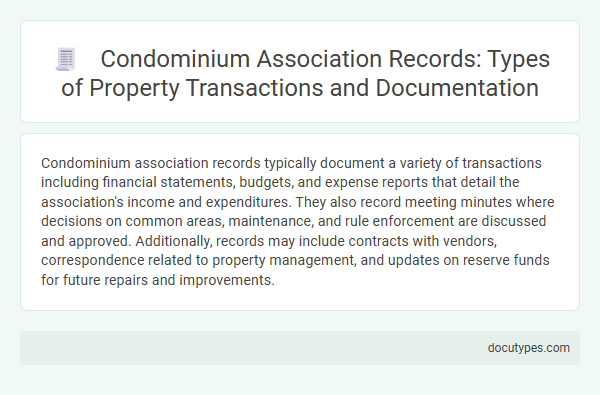Condominium association records typically document a variety of transactions including financial statements, budgets, and expense reports that detail the association's income and expenditures. They also record meeting minutes where decisions on common areas, maintenance, and rule enforcement are discussed and approved. Additionally, records may include contracts with vendors, correspondence related to property management, and updates on reserve funds for future repairs and improvements.
Introduction to Condominium Association Records
Condominium association records document various types of transactions essential for property management and accountability. These records include financial statements, meeting minutes, property maintenance logs, and correspondence related to the association's operations. Understanding these documents helps you stay informed about how the condominium community is managed and maintained.
Importance of Property Transaction Documentation
Condominium association records meticulously document various types of property transactions to ensure transparency and legal compliance. Proper documentation serves as a critical tool for resolving disputes and maintaining accurate financial statements.
- Sale and Purchase Transactions - These records detail ownership transfers, providing legal proof and clarity in property boundaries within the condominium.
- Assessment Payments and Liens - Documentation of payments and any liens helps track financial obligations and enforce property compliance.
- Lease and Rental Agreements - Recording leasing activities ensures adherence to association rules and monitors tenant occupancy.
Maintaining comprehensive transaction records supports effective management and protects the interests of all condominium stakeholders.
Types of Property Transactions in Condominiums
| Type of Transaction | Description | Relevance in Condominium Association Records |
|---|---|---|
| Property Sales and Transfers | Documents related to the sale or transfer of individual condominium units between owners. | Records establish ownership history and ensure proper transfer of rights within the condominium community. |
| Leases and Rentals | Agreements for leasing or renting condominium units to tenants. | Maintains information on authorized renters and compliance with association leasing rules. |
| Mortgage Records | Details on liens or mortgages placed on condominium units by financial institutions. | Essential for understanding encumbrances affecting unit ownership and resale value. |
| Special Assessments | Financial obligations imposed on unit owners for unexpected expenses or improvements. | Records of these transactions clarify your financial responsibilities within the association. |
| Alterations and Improvements | Approvals and records of modifications made to individual units or common areas. | Ensures compliance with association policies and affects property value and resale. |
| Maintenance and Repair Transactions | Invoices and contracts related to upkeep or repair of common elements and individual units. | Helps track expenditures and maintain the overall condition of the condominium property. |
Sales and Purchase Documentation
Condominium association records include detailed documentation of sales and purchase transactions involving individual units. These records typically contain purchase agreements, closing statements, and title transfer documents. You can review these documents to confirm the legality and history of a unit's ownership within the association's jurisdiction.
Leasing and Rental Agreements
What types of leasing and rental agreements are recorded in condominium association records? Leasing and rental agreements involving condominium units are documented to track tenant information and lease duration. These records help ensure compliance with association rules and facilitate communication between the association and tenants.
Transfer of Ownership Records
Condominium association records document various transactions related to property management and ownership. One of the most important types of entries is the transfer of ownership records, which detail changes in property title within the condominium community.
These records include information about the buyer, seller, transaction date, and legal descriptions of the unit. You can use transfer of ownership records to verify property history and ensure clear title during a real estate transaction.
Mortgage and Lien Documentation
Condominium association records commonly include mortgage documentation related to units within the property. These documents detail the financial agreements between unit owners and lenders, ensuring transparency and legal compliance.
Liens placed on condominium units, often due to unpaid dues or special assessments, are also recorded in association records. This information protects the association's financial interests and informs potential buyers of any encumbrances.
Meeting Minutes and Board Approvals
Condominium association records document various transactions essential for governance and transparency. Meeting minutes and board approvals are key components that reflect official decisions and actions.
- Meeting Minutes - Detailed records of discussions, decisions, and resolutions made during board and membership meetings.
- Board Approvals - Formal documentation of authorized actions, including budget approvals, repairs, and policy changes.
- Transaction Tracking - Records ensure accountability by tracking financial expenditures and agreements related to your condominium.
Compliance and Regulatory Recordkeeping
Condominium association records document various transactions critical for compliance and regulatory purposes. These transactions include financial activities, maintenance agreements, and legal proceedings.
Financial records encompass budgets, expense reports, and fee collections to ensure transparency and regulatory adherence. Maintenance contracts and vendor agreements are tracked to verify ongoing compliance with safety and operational standards. Legal documents related to disputes, liens, and resolutions are maintained to protect the association's legal standing and member interests.
What Types of Transactions Are Recorded in Condominium Association Records? Infographic

